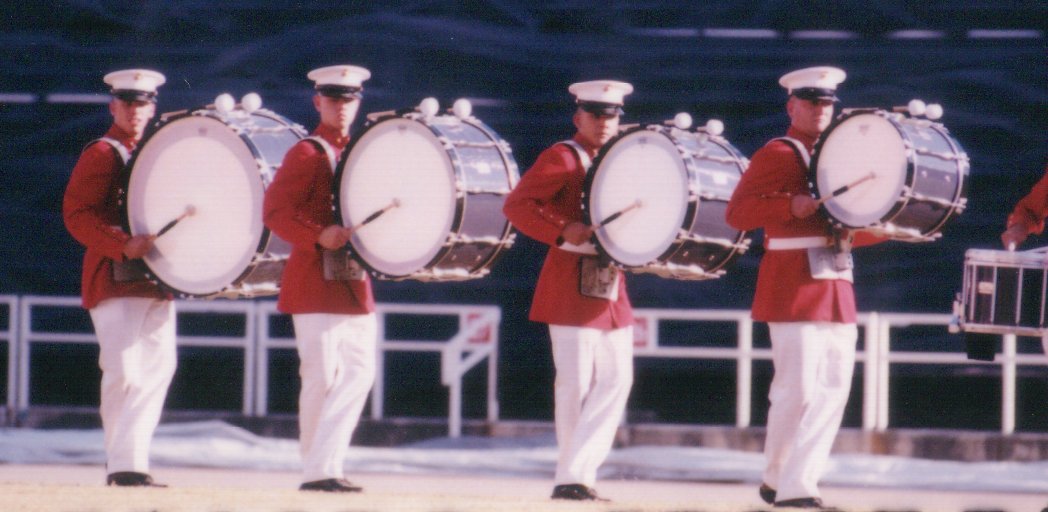In honor of Veterans Day, an article on military bands:
“Music, Culture, and Society (Or Why You Shouldn’t Cut Military Bands)”
Psychology Today author Kimberly Sena Moore writes, “The intersection of music and military service has a rich history.” Our ilk were especially necessary: “Drummers were also involved, using their beats to help companies march in time for many hours and for long days.”
Moore’s article is in response to a Washington Post article by Walter Pincus titled “Vast number of military bands may not be music to Gates’s ears”. It should come as no surprise in a time of necessary cost-cutting that many who look at limiting the dollars going to the military-industrial complex look first to seemingly unnecessary, ancillary enclaves like military bands. It’s not so different than middle and high schools across the country. Music programs seem to have a permanent spot in queue for the budget guillotine.

Both authors make valid points. Pincus’ article is certainly logical from a cost analysis perspective. (Even I didn’t know there were so many military bands.) Moore’s article is more…uh, psychological, obviously. The last thing I want to do is launch a political screed about so-called “fiscal responsibility” on a drumming blog, so rather than get into the particulars of economics and government spending I’ll just relate my personal experience in this specific area.
I spent four years in the Marine Corps: about 2.5 in the infantry, the remainder in the Commandant’s Own Marine Drum & Bugle Corps. This was in a period of comparatively little conflict in which the US was involved: 1997 to mid-2001.
Ours was a unit like many others: loyal, familial, political, petty. And, like all good Marines, we complained and promulgated amongst our ranks our unique brand of (mostly) good-natured hate and discontent over every mile traveled in lousy buses and C-130s (affectionately dubbed “flying dump trucks”). That said, the effect of our performances—hell, the effect of our mere presence in uniform—on people across the country was kind of a magical thing. I won’t be so presumptuous as to say this was a singular feeling throughout the drum corps, but it was at least true for me and those with whom I most closely associated. I’ll be honest: most of us did not enjoy slogging to and fro across the country to play the same drill show in Small Town, Middle America. The op tempo, particularly in the summer months, was grueling with very little down time. And, of course, the utter BS of daily life in the corps/Corps caused more than a few of us to be four-and-out…
Knowing the inner-workings of our dysfunctional troupe, we could never have the same appreciation as our audiences for what we did. Looking back, I for one am certainly glad we took the time to meet-and-greet audiences in all manner of disparate pockets of the country, though we seldom had the energy for it at the time. While we occasionally groaned at the prospect of chatting with the old timers—the ever-present vets with as many stories as pins in their caps—these are now some of my fondest memories.
I can also relate to Kimberly Sena Moore’s emotional experience at her grandfather’s funeral. As a member of the honor guard at Marine Barracks, 8th & I, I participated in scores of funerals. During small services and massive full-honors ceremonies at Arlington National Cemetery alike, I could forget all the nonsense bookending the event and just exist in the beauty and solemnity of the moment. While I made no attempt at disguising my contempt for the countless hours I spent as a human statue in all weather extremes at the Pentagon and the White House for the arrival of some visiting dignitary, I recognized funeral services as one of our few indispensable ceremonial functions. I have forgotten the particulars of all those many funerals, but I doubt any of the people attending them ever will.
Look, I’m not big on rah-rah-sis-boom-bah, so that wasn’t my intention with this post. And I’m not voicing a call-to-arms to save military bands, though I hope I’ve conveyed that at least some functions of some units are anything but superfluous expenditures. I do ask that you take a moment from the inanities of modern life and remember all who have served and all who are serving. Never forget that we have thousands involved in two concurrent wars.
Ah… For old time’s sake: OORAH.
Leave a Reply